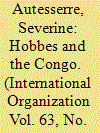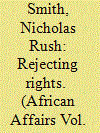|
|
|
Sort Order |
|
|
|
Items / Page
|
|
|
|
|
|
|
| Srl | Item |
| 1 |
ID:
090436


|
|
|
|
|
| Publication |
2009.
|
| Summary/Abstract |
Why do international peacebuilders fail to address the local causes of peace process failures? The existing explanations of peacebuilding failures, which focus on constraints and vested interests, do not explain the international neglect of local conflict. In this article, I show how discursive frames shape international intervention and preclude international action on local violence. Drawing on more than 330 interviews, multi-sited ethnography, and document analysis, I develop a case study of the Democratic Republic of Congo's transition from war to peace and democracy (2003-2006). I demonstrate that local agendas played a decisive role in sustaining local, national, and regional violence. However, a postconflict peacebuilding frame shaped the international understanding of violence and intervention in such a way that local conflict resolution appeared irrelevant and illegitimate. This frame included four key elements: international actors labeled the Congo a "postconflict" situation; they believed that violence there was innate and therefore acceptable even in peacetime; they conceptualized international intervention as exclusively concerned with the national and international realms; and they saw holding elections, as opposed to local conflict resolution, as a workable, appropriate, and effective tool for state- and peacebuilding. This frame authorized and justified specific practices and policies while precluding others, notably local conflict resolution, ultimately dooming the peacebuilding efforts. In conclusion, I contend that analyzing discursive frames is a fruitful approach to the puzzle of international peacebuilding failures beyond the Congo.
|
|
|
|
|
|
|
|
|
|
|
|
|
|
|
|
| 2 |
ID:
139632


|
|
|
|
|
| Summary/Abstract |
Academic and policy interest in the emergence, development, and efficacy of rights has increased substantially over the last twenty years. One particular effect that scholars have recently identified is the connection between the spread of rights across the globe and large-scale reductions in violence. While the expansion of rights may enable reductions in violence, the evidence in this article suggests the opposite may also be true. Drawing on ethnographic research on vigilantism in South Africa, a country deeply invested in the twentieth century rights revolution, the article shows how vigilantes have used the state's expanding rights regime to justify violence. Specifically, it examines the growth and spread of what was at one time South Africa's largest vigilante group, Mapogo a Mathamaga. Mapogo first emerged shortly after the country's transition to democracy and rapidly grew as its leadership preached a gospel that rejected rights, claiming that rights enabled crime and allowed immorality to proliferate. By assaulting suspected criminals, Mapogo's members claim that they are correcting the criminal, the post-apartheid state, and the flawed rights regime on which it is based, an outcome which the existing literature on rights and violence has difficulty explaining.
|
|
|
|
|
|
|
|
|
|
|
|
|
|
|
|
|
|
|
|
|